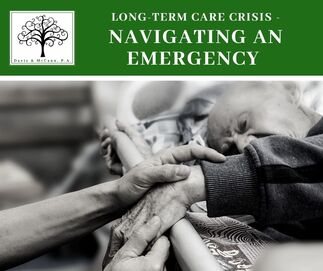 Are you considering purchasing a life insurance policy to benefit your family members after your death? Death benefits from a life insurance policy can be substantial. Benefits can be paid to one or more beneficiaries or to a Trust administered for their benefit. Did you know life insurance can be a key part of your estate plan? While it’s not a necessary component for everyone, it certainly can be useful in many situations. The tricky part comes with knowing whom to name as the beneficiary of your policy. If your estate is very simple and you have few beneficiaries for whom you wish to provide, doing beneficiary planning for your life insurance benefits works well. However, if you have a more complicated family situation or you want to provide your beneficiary with asset protection, you may want to consider naming a Trust as the beneficiary of your life insurance policy. Here are a few examples of why you might want to name a Trust as the beneficiary of your life insurance policy: 1. Asset Equalization. Not all assets are created equal. If you’ve decided to give one child farmland and the other child pastureland, there is likely to be a discrepancy in property valuation. If your goal is to provide an equal inheritance to each child, life insurance proceeds are an easy way to equalize the value of overall estate distributions. If you name a Trust as the beneficiary, you can stipulate how the life insurance proceeds should be used to equalize any inequities among your beneficiaries. 2. Debt payment. If you are concerned that your estate will not have enough cash to pay your estate debts, you should consider using a life insurance policy to provide the necessary cash to cover expenses after your death. If done properly, this will prevent your assets from being sold to pay for outstanding debts. By naming a Trust as the death beneficiary, your Trustee will be able to pay the necessary debts, preserve your other assets for your heirs, and distribute any remaining cash pursuant to your wishes. 3. Beneficiary/Asset protection. Many people can benefit from being a beneficiary of a life insurance policy but not all beneficiaries are responsible enough to receive cash proceeds outright. If your intended beneficiary has a poor track record with money management, handing them a large sum of money outright from the life insurance proceeds probably isn’t in their best interest. However, if you name the Trust as the beneficiary and give specific instructions within the Trust to provide for the welfare of that same beneficiary, your Trustee can more safely provide for the benefit of that beneficiary, without directly allowing them access to the funds. Additionally, Trust planning can provide asset protection for a beneficiary in a difficult marriage who might be heading towards divorce or is facing a lawsuit or bankruptcy. Having your life insurance proceeds pay to a Trust for that beneficiary means those funds should not be available to that beneficiaries’ creditors. Finally, naming a Trust as the beneficiary of your insurance allows for more control and flexibility in planning should your beneficiary die before you or if your beneficiary is a minor child. If you think using a Trust to administer life insurance death benefits may be an estate planning strategy you want to explore, please contact Davis & McCann, P. A., Dodge City, KS. We are members of Wealth Counsel, a national consortium of Estate Planning Attorneys and the National Academy of Elder Law Attorneys (NAELA). We focus our practice on providing clients with the best legal advice on Estate Planning, Medicaid and Long-term Care Planning, Family Business/Small Business Succession Planning, Probate, Trust Administration, Real Estate Transactions, and related matters.  If you have minor children, one of most important things you can do is choose a guardian and formally appoint them in your Last Will and Testament. A guardian is the person you legally authorize to raise your children in the event of your death. Naming a guardian is one of the top reasons young parents create an estate plan. To help you decide on a guardian, here’s a list of topics you may want to consider while choosing a potential candidate: Religion, Political, Moral Beliefs. These topics often are the most important considerations for young parents. Are you comfortable with the proposed guardian’s religious, political, and moral beliefs? Are you confident that your children will be raised in a way that honors your current religious, political and moral framework? Location. Does the person you’d like to name as guardian live a significant distance from you? Are you comfortable having your children raised in the community where the guardian resides? Is the guardian’s home large enough to accommodate your children? Would your children need to relocate to a new school and leave their existing friends? Existing Family. If the person is married, is the marriage stable? Would the spouse welcome and respect your children in his/her home? Does the person have children? If so, are the guardian’s views on education and social activities similar to your views? If the person does not have children, would they be comfortable raising your children? Is the guardian’s method of discipline similar to your own? Age. If you prefer an older guardian, they might be in a better financial position and may have more time to spend with your children, but he or she might be less equipped to help your children face the social pressures of the future. Younger guardians may be more in tune with current issues but due to career demands, they may have less time for the day-to-day duties associated with child rearing. Health. Raising young children is mentally and physically demanding. A guardian with ongoing health issues may not have the energy or strength necessary to provide a stable environment for your children. Is this person in a position to devote the necessary time and energy to help your children fulfill their potential? Finances. Will acting as a guardian for your children cause a financial burden for this person? Do you have provisions in place to provide finances for your children’s care after your death? Is this guardian capable of managing the children’s finances or should you consider naming a separate person as conservator of their funds? Willingness. An honest conversation with the proposed guardian is an absolute necessity. Be sure to discuss the anticipated responsibilities and your desires for your children’s future. He or she needs to understand the role of a guardian and be willing to assume the responsibility. It is important that you always choose an alternate person to name as guardian just in case your first choice is unable or unwilling to serve. Remember, without formally naming a guardian for your children, you will allow the State to make that choice for you. If you have questions about naming a guardian for your minor children or any Kansas estate planning topic, contact Davis & McCann, P.A., Dodge City, Kansas at 620-225-1674. We are members of Wealth Counsel, a national consortium of Estate Planning Attorneys and the National Academy of Elder Law Attorneys (NAELA). We focus our practice on providing clients with the best legal advice on Estate Planning, Medicaid and Long-term Care Planning, Special Needs Planning, Family Business/Small Business Succession Planning, Probate, Trust Administration, Real Estate, 1031 Exchanges, and related matters.  Q: My father’s mental status has been declining this past year and now I’ve discovered he doesn’t have any planning in place. Does his diminished mental capacity mean it is too late for him to do estate planning? A: Not necessarily. If your father’s attending physician has not declared him incompetent, and he still has some capacity, your father may be able to execute legally binding estate planning documents. There are different levels of capacity required for an individual to sign some legal documents versus others. For example, it takes more capacity for an individual to sign a Last Will and Testament than a General Durable Power of Attorney for financial decisions. To determine what level of capacity your Dad has and, thus what planning he is legally competent to execute, he will need to meet with an experienced estate planning attorney. Some of the questions an attorney may ask while visiting with your father include:
Part of an estate planning attorney’s role is to evaluate a client’s competency (or incompetency), as legal capacity or competency requires a subjective opinion provided by a trained attorney. Sound mind a/k/a capacity is determined on a situation-by-situation basis, as legal capacity can fluctuate, even from day-to-day. Attorneys are trained to assess a client’s legal capacity and proceed to a signing only if they believe the client meets the standards of competency necessary for the execution of a client’s legal documents. It’s common for family members of clients who have diminished capacity to request appointments at very specific times of day because their mental clarity is best at that time. For example, they may struggle to understand certain events in the morning but exhibit a good understanding in the afternoon. Mental capacity can fluctuate due to any number of factors: medication, illness, lack of sleep, stress, time of day, etc... It is possible that a client is legally competent one day and incompetent days or even hours later. Failing to have full capacity all day, every day does not prohibit a person from executing estate planning documents. If, in an experienced attorney’s opinion, the client meets the basic threshold of legal competency at the time of signing documents, those documents are legally binding. Because your father has some diminished capacity, it is extremely important that you choose a highly reputable estate planning attorney to assist him with his estate planning. If you have a contentious family who may dispute your father’s estate planning, make sure to let your attorney know so that they can take every precaution to determine legal capacity and to document his/her findings in the client’s file. If your family is contentious, we recommend that your father meet privately with his attorney so that there is no doubt that the contents of his planning were voluntarily and willfully made by your father, without undue influence from you or anyone else. If you have questions about diminished capacity or any Kansas estate planning topic, contact Davis & McCann, P.A., Dodge City, Kansas at 620-225-1674. We are members of Wealth Counsel, a national consortium of Estate Planning Attorneys and the National Academy of Elder Law Attorneys (NAELA). We focus our practice on providing clients with the best legal advice on Estate Planning, Medicaid and Long-term Care Planning, Special Needs Planning, Family Business/Small Business Succession Planning, Probate, Trust Administration, Real Estate, 1031 Exchanges, and related matters.  Q: I want to add my child’s name to the title of my home, so they can keep the house out of probate and receive my home quickly after my death. Do you see any concerns with my plan? A: The answer to your question is a solid “maybe”. Your personal circumstances will dictate whether this estate planning strategy is the best move for you. Adding your child’s name to your deed could speed the transfer of your home to your beneficiaries and keep it out of probate. But, before you run off and put your child’s name on the title of your house you should consider a few of these risks. Gift Taxes. By adding your child to the title of your home, you have made a gift that is subject to gift taxes. The gift is likely far below the current federal gift tax exclusion amount, so you shouldn’t have to pay gift taxes. However, you may need to file a gift tax return if the gift is over the annual exclusion amount. Medicaid benefits. If you need KanCare (Medicaid) assistance to pay for nursing home care within 5 years of adding your child’s name to the deed, you could be penalized when requesting benefits. Child’s Death. If your child dies before you, his/her interest in your home becomes part of his/her estate. This interest in your home will be subject to his/her liabilities and would pass to his/her beneficiaries as named in your child’s estate plan. Someone you don’t know or trust could become the new co-owner of your home. Disagreements. If you decide to sell the house and move, your child could legally refuse to transfer ownership back to you. Also, if your child wants to sell your home, that child could force a partition action, a sale of the real estate done through the court. Child’s creditors. If your child is involved in a serious accident, your house could have a lien placed on it to cover his/her debts not covered by insurance. Similarly, if your child is a joint owner, the value of the home could be subject to his/her creditors, should they face bankruptcy or credit issues. Child’s divorce. If your child gets a divorce after being added to your deed, his/her interest in your house may be part of the divorce settlement. Capital gains tax. If you sell the home after adding your child to the deed, your child may encounter unintended capital gains tax problems. No legal obligation. If you add one child’s name to the deed and instruct him/her to share the proceeds from the sale of the home with your other children after your death, they may not be legally obligated to do so. Your other children could be cut out of the inheritance that you intended for them to have. The type of ownership that you give to your child is a very important factor in your considerations. Should you establish a joint tenancy with rights of survivorship (JTWROS), a tenancy in common (TOC), or perhaps you should do a transfer on death deed? Consulting an experienced estate planning attorney prior to adding anyone to your deed will inform you of the pros and cons of each option, as it relates to your personal circumstance. Without adequate counsel, the complications that could arise from such a move may outweigh any possible benefits. For more information on estate planning, probate or real estate matters, contact Davis & McCann, P. A., Dodge City, KS. We are members of Wealth Counsel, a national consortium of Estate Planning Attorneys and Elder Law. We focus our practice on providing clients with the best legal advice on Estate Planning, Probate, Trust Administration, Medicaid and Long-term Care Planning, Family Business/Small Business Succession Planning, Real Estate Transactions, 1031 Exchanges, and related matters.  If you want your estate plan to be as comprehensive as possible so your family is provided for after your death in the way you intend, there are some key issues you may need to include in your plan. During our 20+ years of estate planning work, we’ve seen some of the same mistakes in estate plans drafted by inexperienced attorneys or online computer-generated forms. Those mistakes generally appear as omissions of language addressing tax planning, incapacity, divorces, spendthrift beneficiaries, beneficiaries with substance abuse issues, or the possibility of a beneficiary receiving government benefits. Here are the most common issues we’ve seen overlooked and that you may need to address in your own estate plan: Federal Gift and Estate Taxes Federal Gift and Estate Tax is a tax on the wealth you accumulated or transferred during your lifetime. This tax typically is paid during the probate of your estate or administration of your trust. Too often we see clients’ families pay more taxes than necessary because simple tax planning language was omitted in their estate plans. After a thorough review of your assets and consideration of your life circumstances, a good attorney will recognize if there is a need for special tax protection language in your estate plan. This language easily can be added to your estate plan and will protect your beneficiaries from potentially hefty and unnecessary taxation. Incapacity Powers of Attorney for both health care and financial needs are the most basic and essential parts of a good estate plan. Yet, routinely, we meet with clients whose prior estate plan does not include either a Health Care Power of Attorney or a General Durable Power of Attorney. Anyone over the age of 18 should have a Power of Attorney for both health care and financial needs. Without these documents, the State will make decisions about your health and assets should you become incapacitated. If your attorney does not offer these as part of their estate plan package, you should be concerned. Divorce No one plans on a divorce when they get married, but it happens. For individuals with an existing prenuptial agreement, your estate plan should reference this agreement and comply with its terms. This is especially important with second marriages involving children. If you have a beneficiary that may be headed for a divorce, then you may want to offer them certain protections within your estate plan to keep your family assets from being distributed to your beneficiary’s soon-to-be ex-spouse. Beneficiaries Everyone wants to believe their loved ones are perfect, but that’s not reality. Nearly every family we see seems to have a spendthrift, someone who simply cannot manage money for one reason or another, or a family member who struggles with alcohol, drugs or gambling. Fortunately, you can provide for beneficiaries who cannot or should not manage money. Additionally, you may have a beneficiary who is receiving governmental benefits. If such a beneficiary were to inherit your assets outright, there is a chance that they would no longer be eligible to receive their government benefits without first spending down the inheritance that you left to them. There are ways to avoid this by utilizing trust planning. Within your estate plan you can appoint a trustee to manage and distribute funds to these beneficiaries, according to your wishes. If your family members struggle with money management for one reason or another, or are receiving government benefits, you should ask your attorney if a trust might be warranted. To provide your beneficiaries with the smoothest transition after your death, we recommend having your estate plan reviewed every 3-5 years by an experienced estate planning attorney. This includes a review of your Will, Trust, Trust funding documents and assets, Powers of Attorney, HIPAA Authorization, Living Will, and Prenuptial Agreement. If you are a business owner, this review should also include your insurance policies, corporate formation documents, annual minutes, and Buy-Sell Agreement. If you have questions about your existing estate plan or new estate planning options, please give us a call. At Davis & McCann, P. A. our focus is to provide the best legal advice in estate planning, farm family estate planning, Probate, Trust Administration, Medicaid and Long-term Care Planning, Family Business/Small Business Succession Planning, Real Estate Transactions, 1031 Exchanges, and related matters.  Having a will is the most basic step you can take in planning your estate. Without this document in place at your death, your State law could dictate how to divide your material possessions, who will care for your minor children (in the absence of a surviving spouse), what age those children will receive access to their inheritance, and who will be responsible for selling or distributing your items of value. Despite these facts, nearly six in 10 adults in the U. S. still do not have a will. In our experience, most parents with children under age 18 have done little or no basic estate planning. The problem, according to Megan L. McCann, estate planning attorney and partner at Davis & McCann, P. A., likely centers around two facts: One, young adults rarely consider the possibility of their death and two, many people assume they have insufficient assets to require estate planning. According to McCann, most Americans undervalue the assets that must be sold or distributed at their death. “Regardless of your age or the size of your bank account, it is very important to have an estate plan in place. After your death, decisions must be made about your debts, bank accounts, real estate, stocks and bonds, vehicles, jewelry, retirement accounts, insurance proceeds, securities dividends, and even pets. If you want a say on who will receive your assets and how or when they will receive them, putting a plan together is necessary.” If you have children, McCann says having a will is critical, if for no other reason than to name guardians for your minor children. “In the absence of a will where you appoint a guardian, the State will decide who should care for your children after your death,” McCann says. “Part of our responsibility as parents is to protect our children and provide a safe future for them. By naming a guardian in a will, you can control who provides that protection and safety for your children, if you are no longer able. Equally important is the need to have financial and health care powers of attorney appointed to act on your behalf should you become incapacitated and unable to do so.” “Tragedy isn’t part of anyone’s life plan,” says McCann, “However, young adults, rich and poor, with and without small children, die every day. The real tragedy is that most of them fail to put a plan in place stating their desires for guardianship of their children and distribution of their assets. This leaves a tremendous burden on the surviving spouse or family.” For more information on estate planning, contact Davis & McCann, P. A., Dodge City, KS. We are members of Wealth Counsel, a national consortium of Estate Planning Attorneys and Elder Law. We focus our practice on providing clients with the best legal advice on Estate Planning, Medicaid and Long-term Care Planning, Family Business/Small Business Succession Planning, Probate, Trust Administration, Real Estate, 1031 Exchanges, and related matters.  When you need to put assets into your Revocable Trust, there are several ways of accomplishing this depending on the type of asset. Let’s break it down so you can easily see how to go about making these transfers.
You can do much of the funding work for your Trust on your own. If, however, you do not have the time, or the desire to do such, contact your estate planning attorney who can assist you with this process. For more information on funding your Revocable Trust, contact Davis & McCann, P. A., Dodge City, KS. We are members of Wealth Counsel, a national consortium of Estate Planning Attorneys and Elder Law. We focus our practice on providing clients with the best legal advice on estate planning, Medicaid and Long-term Care Planning, Family Business/Small Business Succession Planning, Probate, Trust Administration, Real Estate Transactions, 1031 Exchanges, and related matters.  The end of any year is a busy time with holidays, family obligations and this year specifically, the pandemic concerns. However, it also is a good the time to take stock in your personal life and finances and plan for any adjustments you need to make for 2021. The earlier you can do this, the better prepared you will be for the future. Here are some activities we encourage you to do before the end of this year:
For more information on end-of-year planning as it relates to your estate plan, contact Davis & McCann, P. A., Dodge City, KS. We are members of Wealth Counsel, a national consortium of Estate Planning Attorneys and Elder Law. We focus our practice on providing clients with the best legal advice on estate planning, Medicaid and Long-term Care Planning, Family Business/Small Business Succession Planning, Probate, Trust Administration, Real Estate Transactions, 1031 Exchanges, and related matters.  In a perfect world, everyone would establish a long-term care plan well in advance of needing such care, all the necessary finances to pay for any such needs would be in order and everyone in the family would be prepared to help execute that plan at any given moment. But the reality is that most people procrastinate on any type of planning that focuses on the possibility of serious illness or death. When an unplanned event happens that requires immediate long-term care, and in the absence of an existing plan, long-term care ‘crisis’ planning can help you navigate the days to come. What is Long-term care ‘crisis’ planning? This term is based on the notion that an event occurred that now requires you to make decisions regarding long-term nursing home care, including addressing the cost of such care, in a short period of time. Your first step might be to seek advice from professionals who are trained in the area of long-term care planning and stay current on the best methods for addressing your situation, as the rules and regulations of Medicaid are complicated and change frequently. Below are a few of the ways a trained professional might help you manage your long-term care crisis situation:
For more information on long-term care crisis planning, contact Davis & McCann, P. A., Dodge City, KS. We are members of Wealth Counsel, a national consortium of Estate Planning Attorneys and Elder Law. We focus our practice on providing clients with the best legal advice on estate planning, Medicaid and Long-term Care Planning, Family Business/Small Business Succession Planning, Probate, Trust Administration, Real Estate Transactions, 1031 Exchanges, and related matters.  If you’re one of the many small business owners who thinks estate planning is for wealthy, large business owners and executives, perhaps even multi-millionaires, think again. Regardless of the size of your bank account or the size of your business, estate planning can be beneficial for everyone, especially for the small business owner. For many small business owners, their livelihood and family’s security are largely dependent upon the success of their business. Proper estate planning for small business owners can help protect both personal and business assets from creditors. Part of that planning involves how you choose to organize your business. The business structure you choose can also have a major impact on your taxes. You would be wise to review your business organization options to ensure your current or proposed business structure provides you with the best tax and asset protection. Here’s a quick look at some of the business organizational options that are available in the state of Kansas:
|
NEWS YOU CAN USEDavis & McCann, P. A., Archives
April 2021
Categories
All
|

 RSS Feed
RSS Feed